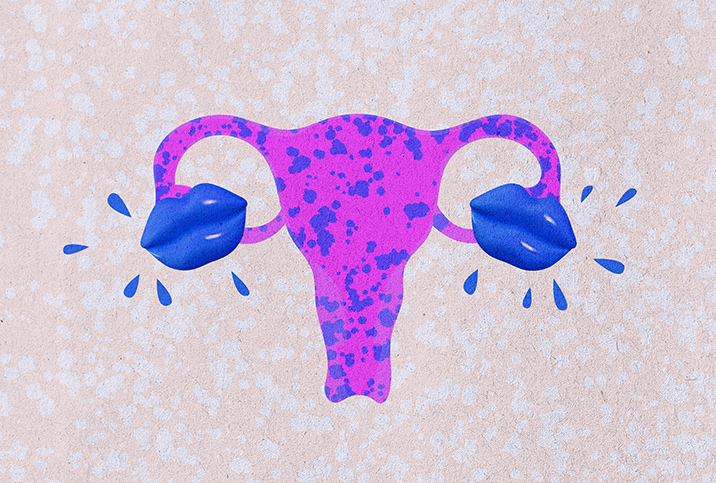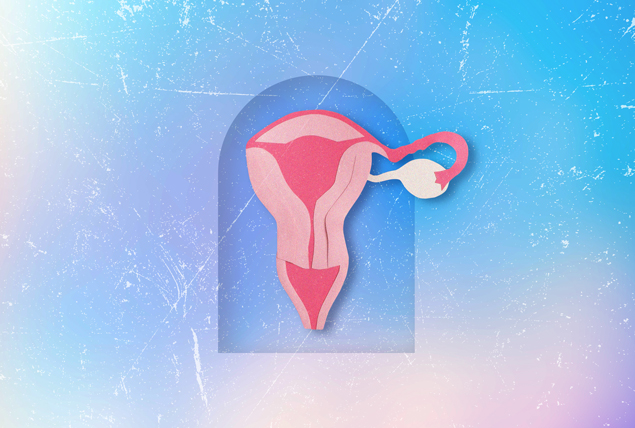What It Means to Have Kissing Ovaries

When you see a diagram of the female reproductive system, you'd be forgiven for thinking the ovaries are firmly situated on either side of your uterus. In fact, ovaries hang slightly behind and below the uterus. In some cases, these two oval-shaped glands grow close enough to "kiss."
Surgery is the only option to get your ovaries "unstuck" and prevent further complications. 'While it is not necessarily an emergency, the condition will not get better on its own.'
"Kissing ovaries" occurs when a buildup of scar tissue causes the ovaries to lean toward each other or bind together—and sometimes to the back of the uterus itself, according to Craig Sobolewski, M.D., a gynecology surgeon and assistant professor of obstetrics and gynecology at Duke University School of Medicine in Durham, North Carolina.
What causes kissing ovaries?
Despite the innocent-sounding name, kissing ovaries are a cause for concern.
"This sign is most frequently associated with [a] severe form of pelvic endometriosis," said Jane L. Frederick, M.D., a reproductive endocrinologist and medical director of HRC Fertility in Newport Beach, California.
Endometriosis causes tissue similar to the kind that usually grows in your uterus to grow where it doesn't belong. Trapped tissue can stick to your ovaries or other places in your pelvis, creating a type of cyst called an endometrioma. Eventually, this buildup can lead to scar tissue (known as adhesions) that tugs your ovaries together toward the center.
Though ovaries in close proximity are a strong sign of endometriosis, the phenomenon can sometimes be a red flag for pelvic inflammatory disease (PID), according to Frederick. Left untreated, PID can increase your risk of ectopic pregnancy and infertility. That's why it's crucial to work with your doctor to discuss your specific situation.
It's important to understand that "kissing ovaries" is not a medical diagnosis. The fact that your ovaries are touching or stuck together is itself a symptom of endometriosis or, less frequently, PID.
Since ovaries aren't visible on the outside, most women discover they have this condition while investigating the source of other, more obvious signs of a problem. The most common symptom? Pain.
"This can be excessive pain with the menstrual cycle, pelvic pain that occurs at times other than a women's period, pain during sex or even pain with bowel movements," Sobolewski said.
How kissing ovaries are diagnosed
Most healthcare providers identify the condition during an ultrasound while looking for the cause of pelvic pain. Pelvic adhesions can also be seen on a CT scan or MRI, Frederick said.
A gynecologist can sometimes identify the problem by feeling "enlarged, stuck ovaries" during a pelvic exam, Sobolewski added.
If your doctor finds signs of endometriosis during a routine pelvic exam, you may be scheduled for an ultrasound. Ultrasounds are the gold standard for pinpointing your ovaries' exact position, determining whether they are "kissing" behind the uterus, and discovering cysts that would also point to endometriosis.
How kissing ovaries affect fertility
Ovaries in close proximity usually indicate severe endometriosis, which can wreak havoc on your chances of getting pregnant.
"When ultrasound reveals the presence of kissing ovaries, the surgeon should expect to find a tangled pelvis, with potential bowel movement in the adhesions," Frederick said.
Anatomical distortions make for challenging and difficult surgeries, Sobolewski said.
While endometriosis can complicate your fertility, don't lose hope. Frederick emphasized the importance of working with an endometriosis specialist to address fertility preservation while treating the condition.
Next steps and treatment
If your primary doctor says you have kissing ovaries, it's time to seek treatment from a specialist in endometriosis, according to Frederick and Sobolewski.
Surgery is the only option to get your ovaries "unstuck" and prevent further complications.
"While it is not necessarily an emergency, the condition will not get better on its own," Sobolewski explained.
Fortunately, preparing your body for laparoscopic surgery—the most common type of surgery for kissing ovaries—is straightforward, Sobolewski said. Cleveland Clinic experts recommend fasting, removing jewelry and wearing loose-fitting clothes on the day of surgery.
Patients with large cysts might also be advised to avoid vigorous exercise and sexual activity until after surgery, Sobolewski added. This is to prevent cysts from rupturing before the procedure.
Is prevention of kissing ovaries possible?
Unfortunately, you cannot prevent kissing ovaries. If you suspect you have endometriosis, talk to your doctor about hormonal birth control, which might lower your risk of new cysts.
Bottom line: Whether you want to get pregnant or not, kissing ovaries requires treatment. The phenomenon typically means you have endometriosis, which can trigger a cascade of physical and emotional challenges. Don't hesitate to seek help, and be open with your surgeon about fertility concerns or plans to expand your family.


















